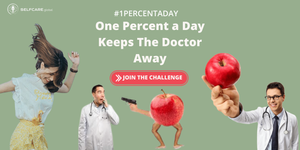QUESTION: Why is there such a high level of non compliance with Doctors and health professional therapeutic interventions? Less than 2 in 10 people (20%) complete the recommended pathways.
When I was younger dealing with adrenal fatigue, chronic fatigue and any other name you could chuck at it. I was simply tired form working 100 hours a week in a hamster wheel of never ending paper work and patients. Driven by a passion to prove myself and work up the hierarchal ladder as quick as I could. Insert deep seeded insecurities and traumas from a younger age, which drove these unconscious behaviours.
As a result I started relying on coffee to get through the day. Which makes sense when you are running on 4 hours sleep and an empty cup energetically. You can imagine what 5 coffees a day, without 3 litres of water would do to the kidneys, endocrine system and the role the stress would play of heightening the sensitivity of my entire neurological and physiological systems.
One day I presented to the cardiologist, after a doctor identified that I had high blood pressure at 25 years of age. Not normal right. My blood pressure was 180/130 at 25 years of age. Yet I was fit and healthy, playing football, eating well... Just really stressed, over worked and tired. As mum said "I was burning the hick at both ends".
When I went to see the cardiologist, in 5 minutes he decided that my therapeutic protocol was this. To remove "Salt from my diet" and go on "blood pressure medication for the rest of my life". It was interesting, because he didn't anything about my lifestyle, eating habits, stress or work load. Little did he know that I had been completely plant based for over 6 months, had removed coffee and was already starting to see my blood pressure drop to 160/125. Plus I had made a decision to reduce my work hours to 40hours a week, which funnily enough is all I was getting paid for anyways at the time.
So yes, I was non-compliant with his therapeutic recommendation. Why? because I knew deep down that this was not the answer. My salt intake was already minimal and I had no desire to be on medication for the rest of my life. Instead, I changed my lifestyle habits for 12 months and miraculously, without stress, without the need for coffee, with a well hydrated and oxygenated body, with a peaceful neurological system. My internal systems recalibrated by themselves and my blood pressure was back within normal limits of 120/80. Plus I simply felt better and could function without restriction or the need for medication.
It took one small change, just 1% a day for 12 months to restore harmony in my body. Where each small change, stacked on top of a previous small positive lifestyle change, started to compound and accelerate my return to normal function and even performance.
Imagine mastering your food, then your mind, then your movement, then your work/lifestyle integration.... one day, one week, one month at a time. The potential is endless if you can stay consistent for 12 months and beyond. What I'm really saying is that, it's a lifestyle change. Not just a therapeutic intervention thats needed to restore harmony in our human vessels.
I've seen people feel better in weeks after leaving a job or relationship that never served them. I've seen people lose weight just by catching public transport and intermittent fasting once a week. Iv'e seen people overcome the "low feelings", call it "depression", call it the "anxiety", by buying a one way ticket to a travel destination they have been dreaming about for years. Who knew that a change of environment and handful of positive new experiences is all they needed to feel better.
When it comes to <20% of people being compliant with any therapeutic recommendation, perhaps we need to revisit and reimagine a new approach. One that is person centric, lifestyle orientated, with simple steps to improve by 1% a day over 12 months, rather than looking for quick fixes and silver bullet strategies.
One Message
So whats the formula. We all know the 80/20 rule. 80% good habits, allowing for 20% of healthy moderation and living life. A simple formula that can add 14 years to your life, by simply stopping, swapping or moderating anything that is self harming. Like alcohol, tobacco, fake foods, stress, processed sugars etc.
However, the 1% a day rule is where the change really happens.
The 1% a Day Formula
1% a day x 365 days = 37 x improvement from where you started.
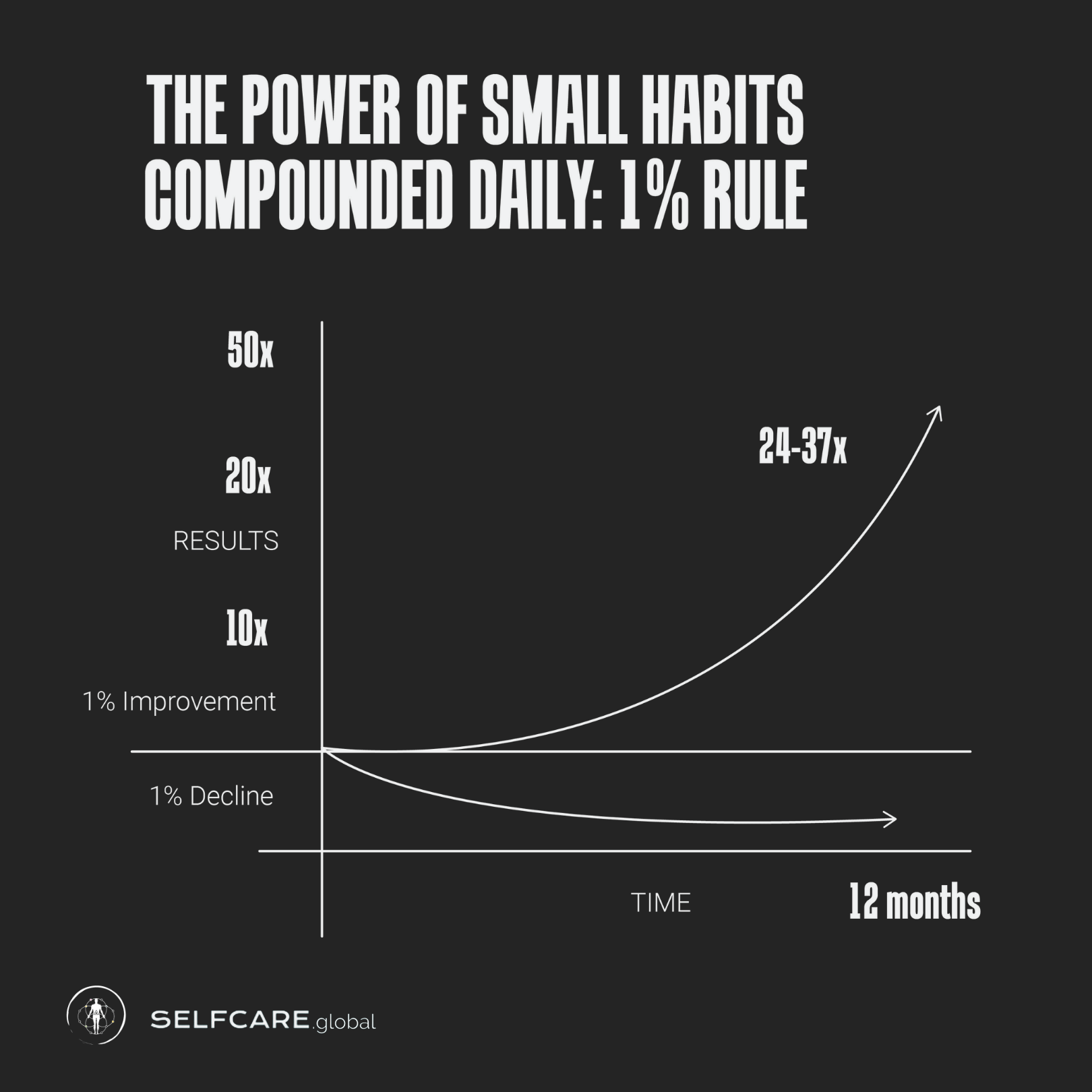
What does the Science Say?
A total of 102 articles was retrieved and used in the review from the 2095 articles identified by the literature review process. Here is what this peer reviewed study shared on therepeutic compliance.
What is compliance?
- In the Oxford dictionary, compliance is defined as the practice of "obeying rules or requests made by people in authority" (Oxford Advanced Learner’s Dictionary of Current English). Even if they are unhealthy themselves? lol.
- In healthcare, the most commonly used definition of compliance is “patient’s behaviours (in terms of taking medication, following diets, or executing life style changes) coincide with healthcare providers’ recommendations for health and medical advice” (Sackett 1976)
The ultimate aim of any prescribed medical therapy or health & lifestyle program is to achieve certain desired outcomes in the patients concerned. A solution, right?
We need personalised pathways that are evidence based, but more importantly solutions focused! With the solution being a return to normal function, where health practitioners becoming progressively redundant from the persons care. Meaning they can care for themselves and create sustainable lifestyle habits.
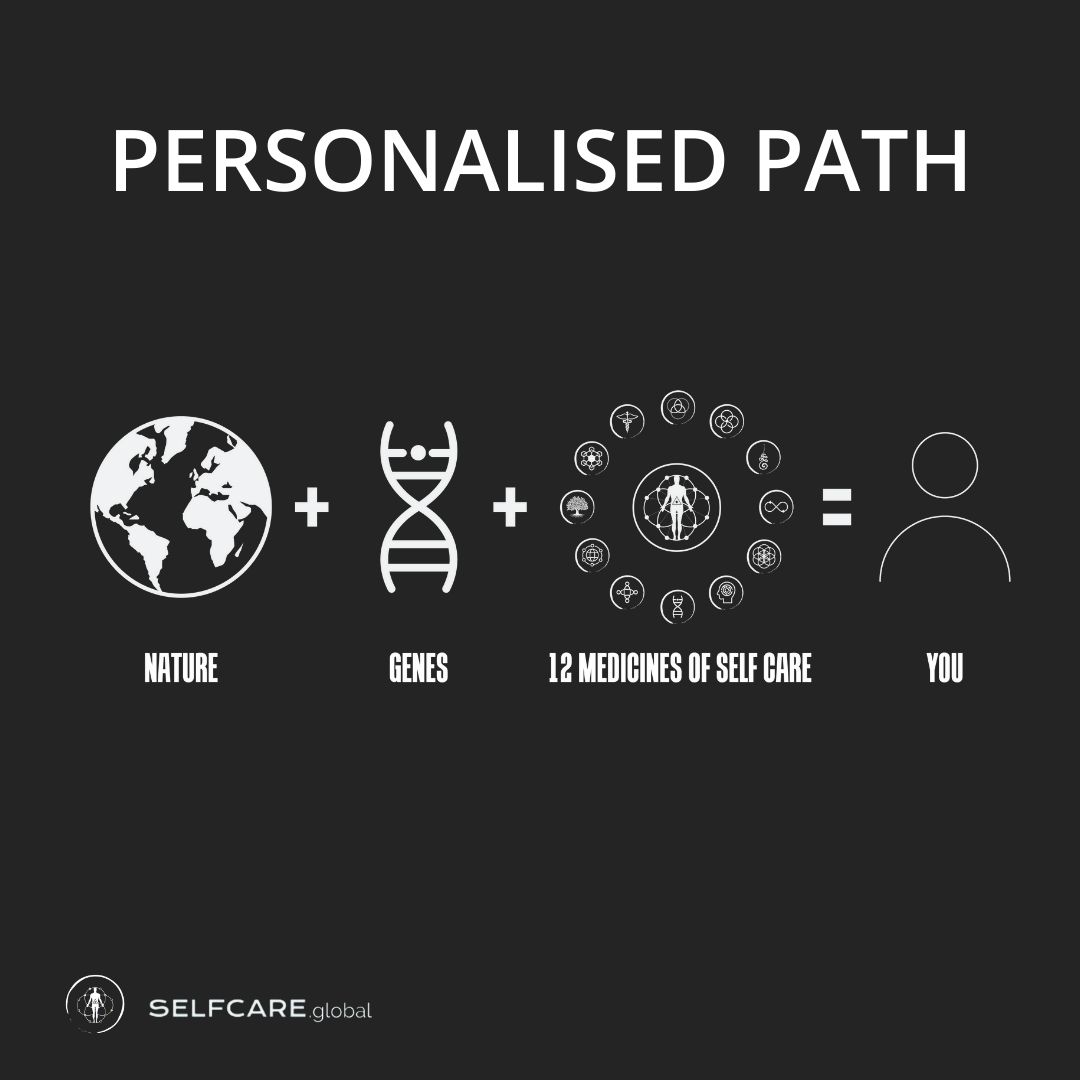
Would it make sense that If a solution wasn't felt or found with the person running the recommended pathway, that they would stop? Or perhaps it was simply the right strategy at the wrong time? For example, recommending a single mum with 4 kids on a single income, goes to the gym 4 x per week to lose weight and improve her cardiovascular health. Without realising that she has no cash flow to afford the gym, nor the time to get there. Perhaps a morning walk with the kids at the beach might have been a better starting point, and connections to community programs that provide daycare for bust mums so that they can have some selfcare time.
These desired outcomes are part and parcel of the objectives (measureable) in the management of the diseases or conditions. As an example, lose weight, reduce blood pressure, improve blood markers, increase functional performance.
However, most patients subjectively (what they say and feel), come in feeling pain, discomfort, some level of dysfunction compared to what they usually can do and simply what to FEEL better or happier. Or no longer be restricted from doing the things they loved doing
However, despite all the best intention and efforts on the part of the healthcare professionals, programs, coaches and "healers". The outcome of feeling better might not be achievable if the patients are non-compliant.
However, if the solution is the end goal. Eg. Feeling better, Moving better... being pain free.... then perhaps the strategy recommended within the context a persons life is the key determinant of compliance.
If a strategy is too complex or overwhelming, or perhaps it simply doesn't work, then it is normal for people to lose faith in the recommended strategy.
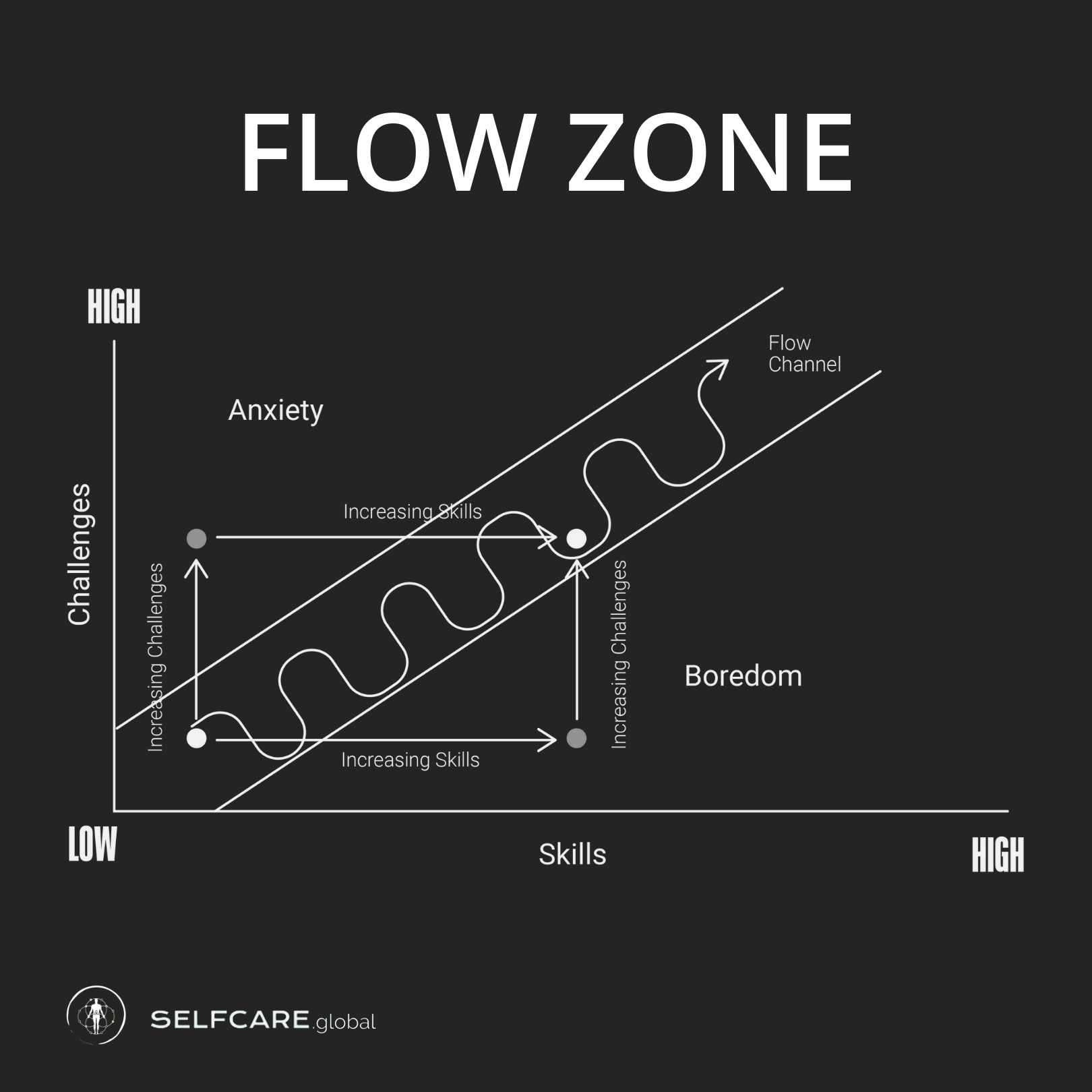
The starting point of any recommended path is also important. For example, a friend once asked me. If someone stubbed their toe, would you give them your book,.. I laughed and said no, of course not.
I would find an immediate solution for their pain, the bleeding, assess and make sure it was ok and then remind them of their own innate process for healing It may be as simple as a bandaid and a reassuring reminder that its just a cut and not a broken toe. Before giving them expensive orthotics, teaching them how to walk properly, decluttering their mind and their open tabs so that they can be present enough to not crash into things in plain sight.
Therapeutic compliance with health programs and pathways has been a topic of clinical concern since the 1970s due to the widespread nature of non-compliance with therapy. The real question with western and allopathic medicine, is why is the non-compliance so high? Perhaps rather than adminestering drugs and quick fixes, we need to remember the person in the context of their problem.
Therapeutic compliance not only includes patient compliance with medication but also with diet, exercise, or life style changes.
However, perhaps we are missing a crucial point:? Perhaps people aren't listening to health professionals and practitioners, because they aren't walking their talk? When I was burnt out and had no energy to get to the gym each week, how could I possibly recommend with congruency for others to do it.
Perhaps people aren't listen to us as health professionals, because we are not congruent in our own advice and recommendations.
Perhaps the issue with compliance and recommended pathways is trust.
More and more people are seeking alternative and complementary therapies, seeking advice from people who are living good health and vitality. Even is they don't have an accredited medical degree. Why? because they are seeking solutions and these complementary practitioners, coaches and healers may already be living in the solution that the patient is seeking.
Perhaps as health professionals we need to level up our game and not be part of the very statistics we are inspired to change. This process isn't just for every day people, its for all of us.
The 12 Month Rule
It took me two, to three years to push my body into disharmony and dysfunction.
I wish people would have told me that it would take at least 12 months to rebalance it and restore that harmony once again. This is my message for you, especially for anything that has been longstanding for over 6 months.
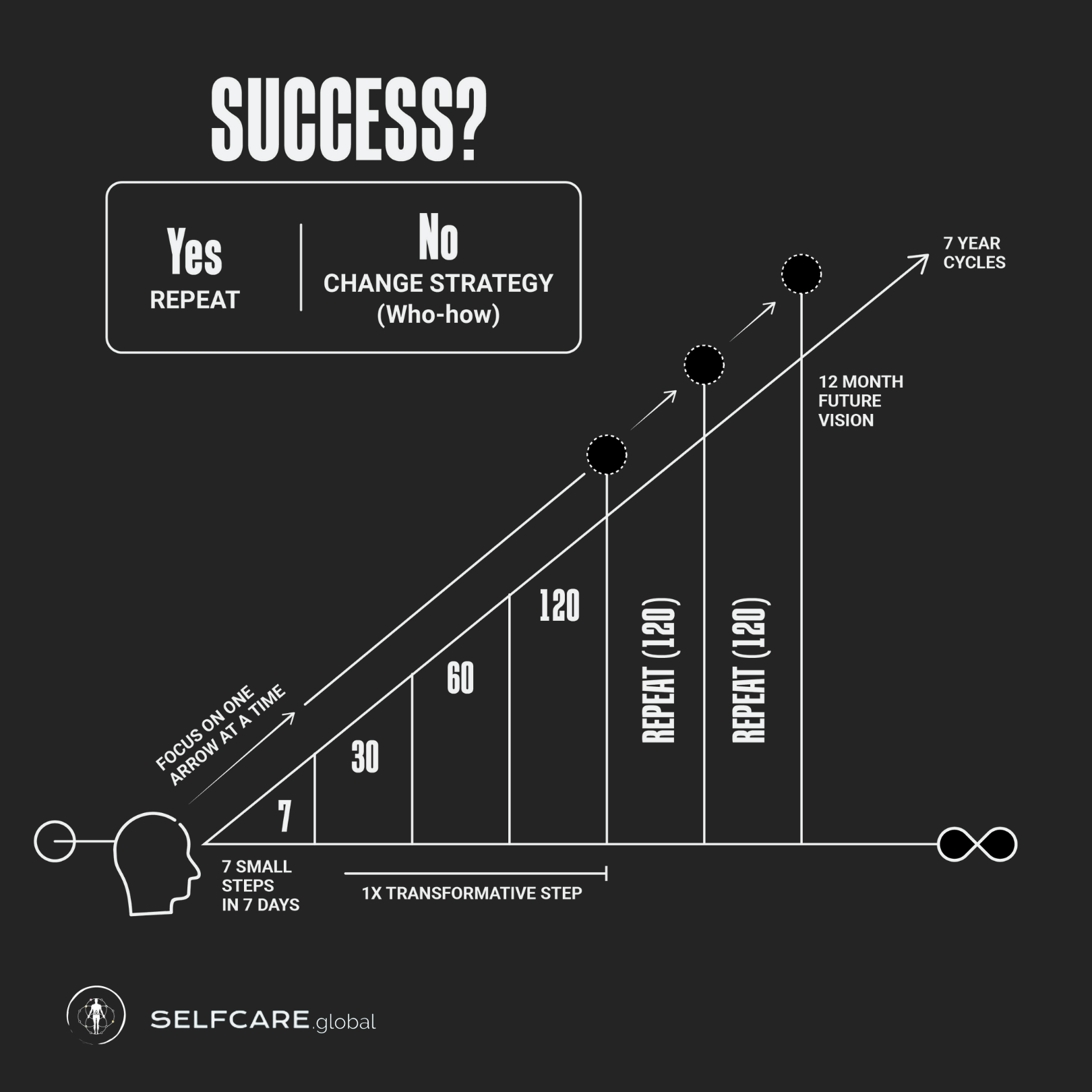
For anything acute, like an injury. Something that has been around for less than 1-6 months. The natural healing process for every system in the body is complete within roughly 6 months. 12 months at the most. Even if you broke your femur in a car accident. Within 6 months it would be healed. The next 6 months, would simply be building back the muscle mass and function, after 6 months of not using it as you once did.
Which means that, anything that has been hanging around for longer than 6-12 months. Is driven by your daily lifestyle choices. Something to think about and be open to change. The awareness that what you are doing may actually be prolonging or exacerbating the injury beyond the bodies normal healing time frames.
The 80/20 Rule
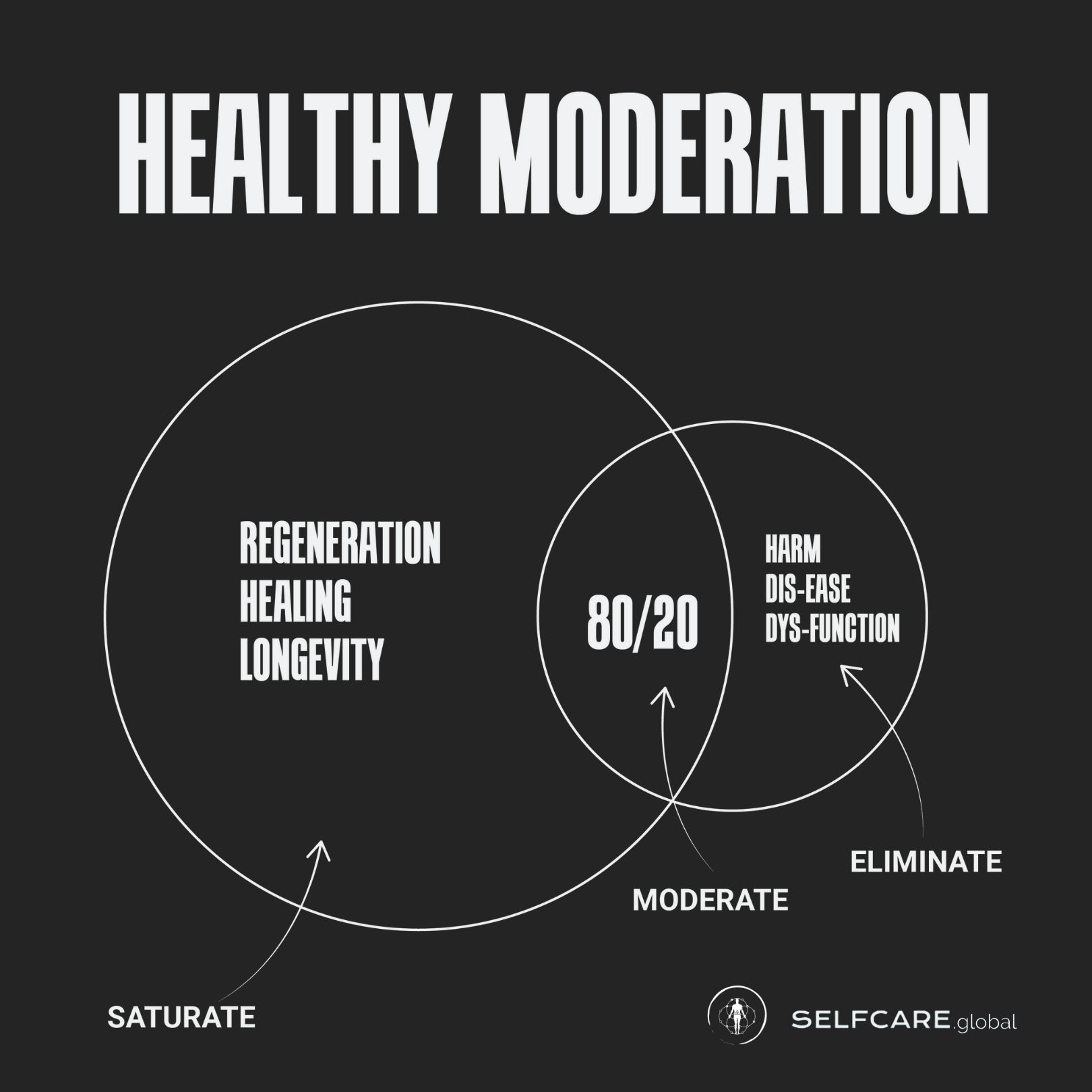
France gave us permission to enjoy healthy moderation. What if we learnt from the French that life isn’t so serious, and that we can have our cake and eat it too, with humor, elegance, grace and style? The French show us that it’s all about moderation, not excess. It is more about good things being enjoyed and shared. It’s quality, not quantity.
In Sardinia, did you know that moderate but regular consumption of wine (with friends and/or food) is part of some centenarian lifestyle. Perhaps it is less about the fermented grapes and more about the social connection and natural food. None the less, it is a practice that has stood the test of time.
he key point is that self-care is not about perfection. It’s about finding what works for you in the context of your life.
Add 14 years to your life span?
Would you like to add 14 years to your life with Healthy Moderation?
If you are not yet listening, this is especially applicable to any of the 4–7 billion people living in the red and orange zones on the integrated health and wellbeing spectrum.
Dr Greger campaigns that “adhering to [just] 4 simple healthy lifestyle factors can have a strong impact on the prevention of chronic diseases.”
Four simple health behaviors may cut our risk of chronic disease by nearly 80%, potentially dropping our risk of dying equivalent to that of being 14 years younger.
- Not smoking; recently.
- Not being obese.
- Move: exercising half an hour a day (well at least 21 mins)
- Food: eating healthier. Eat food, mostly plants.Voila!
Would you be willing to adopt these four simple behaviours to cut your risk of developing a chronic disease by 78% - 95%?
Imagine this.....
- 80% of heart-attack risk, gone.
- Half of stroke risk,
- a third of cancer risk; simply gone.
- Reduce the risk of type 2 diabetes by 95%,
Think of what that means, in terms of the numbers and spending. Chronic diseases account for over 70-80% of a governments medical budget. Imagine what we could do if we solved a preventable 47 trillion dollar problem globally.... By 20%, 40%, 60%, 80% or even 95% by adopting these 4 changes.... That's a lot of extra resources and healthy people to build a better future together.
By simply integrating these 4 simple behaviors into your daily lifestyle you can turn back the clock 14 years and reduce your risk of dying prematurely by 80-92%! (Read that again)
STOP / SWAP / MODERATE / ELMINATE
If you can’t stop it, then try to swap it or at least moderate the level of self-harm you impose on those cells of yours.

By “not smoking” they just mean not currently smoking. Remember that those beautiful lungs of yours regenerate every five or so years. Even if you smoked a pack a day in your 20’s, you can still regenerate healthy lung cells in your 40’s and beyond.
By “healthy diet” they simply mean complying with rather simplistic dietary guidelines set by governing bodies in each country. Eat more plants; get your 2 fruits and 5 vegetables each day. Drink plenty of water; avoid harmful processed “franken-foods” full of sugar and low on the nutritional density you need to build healthy cells.
By “physically active” they simply refer to at least 21 minutes out the 1440 minutes that we all have access to each day. You can move in a way that doesn’t feel like a chore, just get the heart rate up to a moderate level where it’s difficult to hold a conversation and you will be in the zone that creates a positive change in your body.
Dr Greger shares that those who simply,
- “managed at least one of the three behaviors had a 40% lower risk of dying”21 prematurely.
- Those that integrated, “2 out of the 3 behaviors, cut their risk of dying in half!” While those that integrated, “
- all 3 behaviors cut their chances of dying by 82%!”22
By knowing how not to die, how to minimize self-harm and how to integrate the basic foundational behaviors into our lifestyles, we can now focus on living towards longevity and optimizing our human experience with a human vessel that is resilient enough to withstand any adventure you choose.
Call To Action
Join the #1percentaday challenge.
Choose 1 medicine and build one small habit by 1% a day. Then add another, until you have a morning routine that masters these 4 core medicines.

Summary
Everyone knows about the 80/20 principle. But 99% of our life is controlled by the small 1% of decisions we make. It only takes 10 seconds of courage to overcome any fear or behaviour that may no longer be serving you.
We all want to compound our wealth by 1% a day, but what about our health?
A Millionaire consultant shared how one decision to leave his job, resulted in him changing environment, buying a one way ticket to his favourite destination, surrounded himself with an inspiring proximity, freed his time and enabled him to build a passion and purpose based business that turns over 600k per month. Don't under estimate the power of 1%. 1 small step, 1 courageous decision, swapping 1 behaviour that no longer serves you, introducing 1 new ritual into your day.
The point is that these principles apply to health, business and relationships.
A 4 Step Formula to feeling 37x better in 12 months time.
- The 1% a day Rule: 1% a day for 12 months = exponential change in your health and lifestyle. Take one small step after the next.
- 80/20 Rule: Stop, swap, moderate or eliminate 4 simple behaviours to add 14 years to your life. Start with one, that add the others.
- The 12 month rule: A sustainable lifestyle change is the end result. No quick fixes. Set a vision for 12 months and build by 1% a day, using the 80/20 rule to allow for some fun and play along the way. It's about progress, not perfection.
- 4 behaviours that can add 14 years to your life and reduce your risk of dying prematurely by 80-95%! Even with healthy moderation
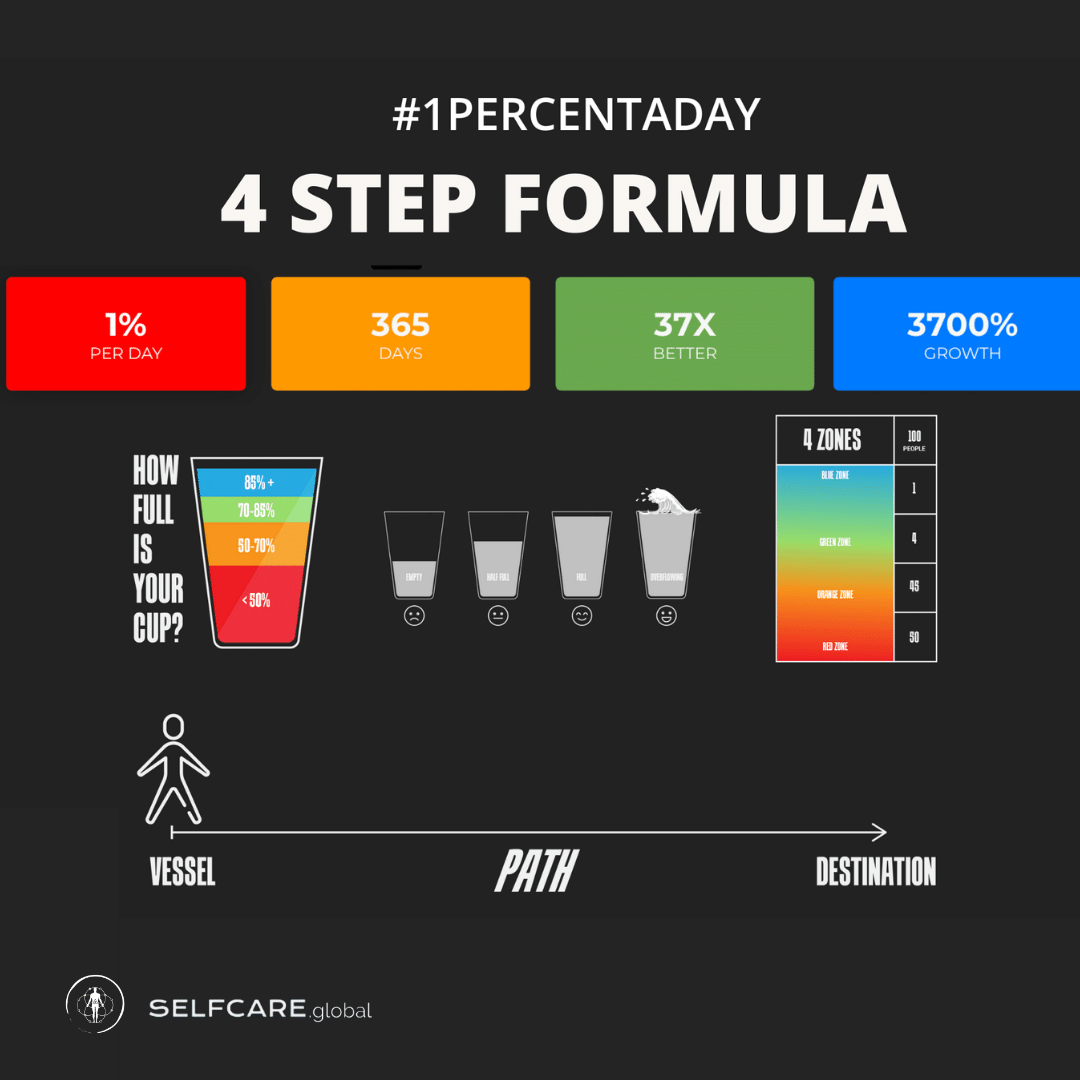
REFERENCES
This is directly referenced from the best-selling amazon SelfCare Book "Lifestyle Medicine For the People" by Rory Callaghan. If you would like to read more content like this. Grab the free online chapters of the book or a hard copy.
We have done our best to reference everyone’s expert opinions, peer-reviewed science, and original thoughts, all references available here and referenced in the text.
We also understand that most thoughts are not our own and there is a collective unconsciousness, unconsciousness, and universal mind stream of energy that is always at work. How are references are sorted and filtered is here.


